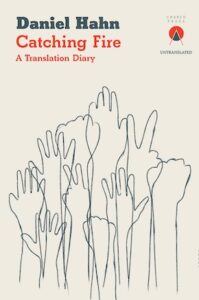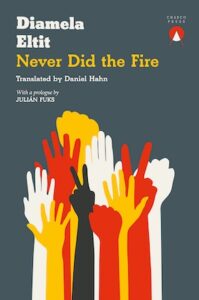Frontists, Stalinist and murderers
by Daniel HahnFrentista, estalinista, asesina loca. Una palabra detrás de otra, un conjunto de palabras elaboradas en una ecuación implacable. Sílabas sonoras, perfectas, que iban organizando una cadena armónica que resonaba igual que una recurrente letanía.
So begins the next chapter, and I know it’s going to cause me trouble. The first sentence is just four words:
Frentista, estalinista, asesina loca.
The first word, Frentista: this could be “Frontist”, if we actually used such a word in English, which we don’t. I believe (though will check) that it refers to a supporter of a specific frente (a political front), which in this case is a Chilean far-left revolutionary guerrilla movement. That means it’s a word that will be familiar to the book’s Chilean readers and carry with it a whole heap of powerful associations. But that is no use to most of my readers, clearly. If somebody called you a “frentista!” in Chile, that would have meant more than somebody yelling “hey, frontist!” at you in English, which just sounds silly. How, then, to convey what’s required without any context?
The second word, estalinista: this simply means “Stalinist”. We tend to capitalise such things in English more than they do in Spanish, but otherwise these words are a simple swap: estalinista => Stalinist. Hooray.
The third word, asesina: the word means murderer, killer, assassin (you can see the relation: asesina, assassin), but – this is important – referring unequivocally to a female killer, not a male one. We have murderess in English, I suppose, but that’s not a word I’d choose to use if I can possibly avoid it. Besides I like the word “assassin”, even if it’s a bit weightier than “killer”, not least because it would allow us then to keep many of the same sounds as the Spanish (estalinista asesina, Stalinist assassin) – but assassiness isn’t a thing. (Sassas… sassassiness…? Nope, no idea.)
If I tell you that “Outside my window I could see grey streets, cars and people” – can you be sure whether or not the cars and people are grey, too?’
The fourth word, loca: this word means mad, crazy, and it, too, is in the feminine form, agreeing with asesina. It seems quite clear by the end of this little sentence that these three epithets are all referring to the same person, rather than a trio – a Frontist, a Stalinist and an assassin (walk into a bar?) – but because adjectives in Spanish usually follow nouns, having this “mad” at the end of the list means it could be attached either just to the last of the nouns or to all of them – so either she’s a Frontist (or whatever), a Stalinist, and a mad killer (woman), or a mad Frontist (or whatever), Stalinist and killer (woman).
(Think about the equivalent in English, where one might put an adjective at the start of the list: if you decide to taste green eggs and ham, you know there’s a chance the green could be referring to both foodstuffs, not just the first. If I tell you that “Outside my window I could see grey streets, cars and people” – can you be sure whether or not the cars and people are grey, too?)
Usually context offers some clues, but, being the start of a chapter, we go into this sentence without context, not even knowing who’s being described. So… no help there.
Incidentally, neither Frentista nor estalinista are gender-specific, so give no indication of the gender of their subject; we only know it’s a woman being described when we reach asesina loca (I’ll write about this problem shortly).
In English we could add a noun, some derogatory term that tends to be used for women: “Stalinist, murderer, mad commie cow/bitch”? It could also be e.g. “murderous bitch”, or something, but I’m not sure calling someone murderous is the same as calling them an actual murderer, is it? Oh, and I know, commie isn’t quite good enough for Frentista (supporter of the [insert specific name] Front), but you get the idea for now.
One thing that has become very clear even in just the first few pages of the book is the density with which Diamela writes – it’s not dense in the sense of being clogged or impenetrable, just in the economy with which so much happens in the language. Concision is so hard to retain in translation, and so far in this book there’s no sprawling, there’s no sagging, there are no extra words. So one of the things I’m going to have to do as I proceed is keep that totally disciplined tightness to my prose, too. The problem, though, is how do I do all the things she’s doing in this sentence… in four words?
Incidentally, I do also have a clear sense from the Spanish of how I’d like that short sentence to sound, with lots of echoing letters and syllables. (Try reading it aloud – even if you don’t know any Spanish, it’s a perfectly phonetically logical and regular language, so your guess will be pretty close.) But that awareness of the sound is not helped – nor is my mood – by the lines that follow that opening, describing it. Here, just in draft form:
[Frentista, estalinista, asesina loca.*] One word after another, a group of words developed into a relentless equation. Resonant, perfect syllables, organising a harmonic chain that rang out like a recurring litany.
Oh, thanks. No pressure, then.
* In the final version: “Stalinist, extremist, crazy killer bitch.”
Extracted from Catching Fire: A Translation Diary (Charco Press, £9.99)
 Daniel Hahn is a writer, editor and translator with over eighty books to his name. His translations from Portuguese, Spanish and French include fiction from Europe, Africa and the Americas and non-fiction by writers ranging from Portuguese Nobel laureate José Saramago to Brazilian footballer Pelé. Recent books include the new Oxford Companion to Children’s Literature and a translation of an Angolan novel. He is a former chair of the Society of Authors and is presently on the board of a number of organisations that deal with literature, literacy, translation and free expression. In 2021 Daniel was made an OBE for his services to literature. For Charco Press, Daniel has translated Resistance (2018) and Occupation (2021), both by Julián Fuks, and Never Did the Fire by Damiela Eltit. Catching Fire is published in paperback and eBook by Charco Press.
Daniel Hahn is a writer, editor and translator with over eighty books to his name. His translations from Portuguese, Spanish and French include fiction from Europe, Africa and the Americas and non-fiction by writers ranging from Portuguese Nobel laureate José Saramago to Brazilian footballer Pelé. Recent books include the new Oxford Companion to Children’s Literature and a translation of an Angolan novel. He is a former chair of the Society of Authors and is presently on the board of a number of organisations that deal with literature, literacy, translation and free expression. In 2021 Daniel was made an OBE for his services to literature. For Charco Press, Daniel has translated Resistance (2018) and Occupation (2021), both by Julián Fuks, and Never Did the Fire by Damiela Eltit. Catching Fire is published in paperback and eBook by Charco Press.
Read more
 danielhahn.co.uk
danielhahn.co.uk
@danielhahn02
Author portrait © John Lawrence
Diamela Eltit is one of Latin America’s most daring writers and is highly regarded for her avant-garde initiatives in the world of letters. During the Pinochet dictatorship, she participated in the collective CADA, staging art actions against the dictatorship, and published her first novels to universal acclaim. She has been honoured by the Modern Language Association in the United States and Casa de las Americas in Havana, received fellowships from the Ford Foundation and the Guggenheim Foundation and been writer-in-residence at Brown University, Washington University in St. Louis, Columbia University, UC Berkeley, the University of Virginia, Stanford University, Johns Hopkins University and the University of Cambridge. The winner of the 2021 FIL Literary Award in Romance Languages, she is currently the Distinguished Global Professor of Creative Writing in Spanish at NYU. Her English-language debut Never Did the Fire (Jamás el fuego nunca), translated by Daniel Hahn, telling the story of an ageing couple of former revolutionaries whose relationship is dissolving as they look back on the loss of both their child and their ideological beliefs, is out now from Charco Press.
Read more
Damiela Eltit at NYU



